The Role of AI in Personalizing Travel Experiences and Enhancing Satisfaction Among Eco-Conscious Tourists in Algeria
DOI:
https://doi.org/10.35945/gb.2025.19.005Keywords:
AI-Driven Personalisation, eco-conscious behaviour, traveler satisfaction, AlgeriaAbstract
This study examines the impact of AI-Driven Personalisation on traveller satisfaction and eco-conscious behavior among Algerian tourists. Data was collected from 160 Algerian travellers through a survey to understand how AI influences their travel experiences and environmental awareness. The results show a significant positive relationship between AI-Driven Personalisation and both traveller satisfaction and eco-conscious behavior. Personalization enhances travellers’ enjoyment by offering more relevant experiences and encourages more sustainable choices, such as eco-friendly accommodations and transportation. The study also identifies demographic factors that influence the effectiveness of AI personalization, including age and the use of specialized travel platforms. Younger travellers, who are more familiar with digital technologies, tend to benefit more from AI-driven recommendations compared to older tourists. These findings suggest that AI-Driven Personalisation can effectively promote sustainable tourism by improving traveller experiences and encouraging eco-friendly behaviors. Tourism providers can use AI to tailor suggestions to individual preferences, enhancing both the quality of the travel experience and the environmental impact. Future research should focus on the long-term effects of AI-Driven Personalisation, exploring its potential to shape future tourism trends and its broader impact on the industry.
Keywords: AI-Driven Personalisation, eco-conscious behaviour, traveler satisfaction, Algeria.
Introduction
The tourism industry is one of the industry sectors affected by artificial intelligence.[1] This field is expected to transform various sectors and promoting both environmental sustainability and business success.[2]
According to the United Nations Environment Programme (UNEP) and the World Tourism Organization (WTO), sustainable tourism is the “Tourism that takes full account of its current and future economic, social and environmental impacts, addressing the needs of visitors, the industry, the environment and host communities”.[3] Madjid et al. Emphasize that sustainable tourism requires a harmonious balance between environmental, economic, and social dimensions.[4] It also requires responsible behaviours from individuals.[5]
The International Ecotourism Society (TIES) considers ecotourism as responsible travel to natural areas that protects the environment, improves the well-being of local residents, including interpretation and education. Education is meant to be inclusive of both staff and guests.[6] Eco-tourism, also known as responsible tourism, attempts to limit negative effects on the environment, support local people, and encourage cultural preservation.[7] Both statements highlight responsible tourism, which aims to reduce environmental damage, help local people, and protect cultural heritage. Education and active engagement from all stakeholders are critical for developing sustainability and cultural awareness in tourist activities.
AI is rapidly being used across several service industries, such as travel and tourism, due to its great learning capacity, flexibility, and connectivity.[8]
Several studies have explored the potential of AI in the travel industry. For instance, Vecchia et al. Investigated the use of AI-powered recommendation systems (RSs) where one or more attractions must be recommended to users based on preferences, contextual aspects, and various other limitations in a sustainable way.[9] Their findings demonstrated the effectiveness of AI in matching travellers with eco-friendly recommended systems that align with their interests. Similarly, Milton (2024)[10] investigated the role of AI in improving energy usage and waste management in hotels, demonstrating the potential for AI-driven solutions for reducing the environmental effects of the tourist industry. AI-driven solutions for enhancing energy efficiency and waste management in hotels directly contribute to the aims of sustainable tourism. AI promotes resource efficiency and minimizes waste, which aligns with sustainability values. This promotes an eco-friendly tourist company by preserving natural resources and limiting tourism’s negative environmental consequences, both of which are critical for the sector’s long-term sustainability.
This study focuses on the use of AI-Driven Personalisation to improve the eco-conscious travel experience. The research will examine the possible benefits, challenges, and future trends of AI in this context. The main objective is to build a more sustainable and responsible tourism industry. Understanding AI’s role in supporting sustainable tourism and increasing visitor pleasure allows us to build ways for delivering personalized experiences that are consistent with environmental values.
Research Problematic
Based on the literature, we propose the following research question: How does AI-Driven Personalisation impact the satisfaction of the Algerian eco-conscious travellers? And if there is a significant impact, does this impact significantly vary across different demographic groups of Using Specialized platforms, Age, and Educational Level? Lastly, do the Daily green behaviours and public self-awareness moderate the relationship between AI-Driven Personalisation and traveller Eco-Consciousness Behaviour?
To investigate these questions, we propose our conceptual framework:
Conceptual framework
Figure 1: Conceptual framework of the study
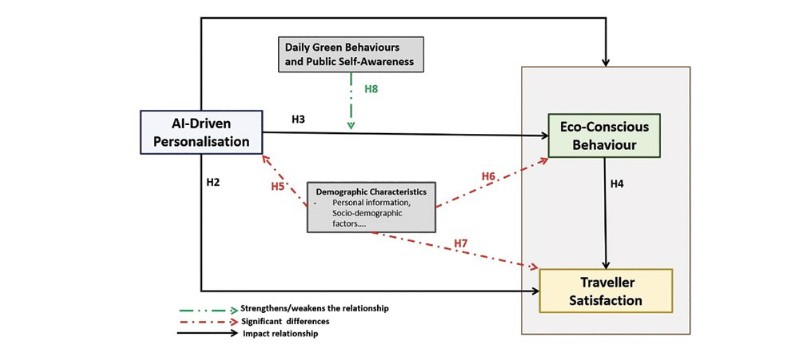
Source: Proposed by the author
The main objective in this research is to examine the potential for AI-Driven Personalisation to improve environmentally conscious travel experiences. This includes looking into the benefits, limitations, ethical concerns, and practical uses of AI in this context. The study’s focus is to provide a deep insight into how AI may be effectively utilized to promote sustainable tourism and develop customized experiences that are linked to traveller values and environmental objectives.
Literature review and hypothesis development
Understanding Eco-Conscious Travel: Eco-conscious travel, also known as green travel or eco-tourism, focuses specifically on the environmental sustainability of tourism within a destination landscape.[11] Thus, Eco-conscious travel is a form of tourism that strives to minimize the negative environmental effects of travel. In other words, it is a conscious effort to travel and take into consideration to preserve natural resources, protect cultural heritage, and support sustainable development.
In their study by Sahabuddin et al. (2024),[12] they identify tourist satisfaction as a key factor influencing loyalty, environmentally responsible behaviour (ERB), and environmental commitment. The findings show that environmental value has a substantial effect on tourist satisfaction. Furthermore, visitor satisfaction is strongly correlated with tourist loyalty, ERB, and environmental commitment to the place or destination. Chen et al. (2023)[13] recommend that tourism destinations should maintain a conducive environment to develop tourist ERB, particularly when tourists exhibit a high level of public self-awareness. Previous studies have also shown that satisfactory AI services provide visitors with an exceptional trip experience and influence the benefits of tourism products.[14] In their study, Escobar-Farfán et al. (2024)[15] demonstrated that customers prefer brands relevant to their identity and enhance credibility and trust, favouring attitudes and behaviours that increase consumption. Travellers, like customers in general, like travel brands that reflect their character, values, and beliefs. When a brand shows relevance to a Traveller’s eco-conscious values, it increases confidence and credibility. This connection generates good sentiments toward the brand, resulting in improved pleasure with the travel experience, as Travellers feel understood and valued, which can lead to repeat bookings and loyalty.
An Eco-conscious behaviour or Pro-environmental also known as the Eco-friendly tourist behaviour, happens when an individual tries to limit his/her negative effects on the natural environment and contribute to environmental conservation.[16] This behaviour is positively influenced by five emotions, as the Kvasova (2015) study found: extroversion, agreeableness, conscientiousness, neuroticism, openness. Other studies found that the Ecoconscious behaviour or Pro-environmental behaviour is positively influenced by situational factors such as tourism types or activities, personal emotions like awe and guilt, and individual motivation.[17] This individual motivation, as we supposed in our study it’s the Daily Green Behaviours and Public Self-Awareness as a mediator variable (DGB&PSA); these are the main supposed as a bridge between environmental attitude and eco-friendly behaviour.
Studies investigated which generation is more widely known as the most eco-conscious generation, and they found that Generation Z is more accepting of eco-friendly travel.[18] In our study, we will focus on multiple generations from boomers to Generation Z, to know how age affects the eco-conscious behaviour of tourists. Also, the eco-friendly behaviour is affected positively by environmental and health concerns and service quality.[19]
Successful AI-Driven Personalisation Initiatives in Eco-Tourism :
- Booking Platform (Netherlands 1996): With more than 610.9 million visits to its website,[20] the platform takes into consideration factors such as energy efficiency, waste reduction, and local impact to identify eco-friendly options. In October 2023, Booking.com announced its new initiatives around Sustainability.[21]com has integrated AI into its platform to recommend sustainable accommodations based on traveller preferences and location. These initiatives enhance the travellers’ experiences with AI-powered recommendations that help to find and book sustainable accommodations, contributing to increased demand for eco-friendly tourism.
- UK-based Skyscanner (UK 2003): this is a travel search engine that provides flights to hotels, and car hire and plan booking to many tourism destinations. Its main mission is to adopt the global transformation to modern and sustainable travel.[22] As a premier travel search platform with a 70 million monthly active user base and extensive global partnerships with about 1200 global partners. Skyscanner offers comprehensive flight data that closely aligns with booking trends.[23] Skyscanner has launched its app-exclusive Savvy Search tool, powered by OpenAI’s Chat GPT technology, to provide travellers with an easier way to plan their customized trips.
Eco Tourism and AI status in Algeria: in the Strategic Tourism Development Plan (SDAT) 2025 for Algeria, this strategic plan aims to make tourism a pillar of the Algerian economy by capitalizing on the country’s diverse assets (cultural, natural, historical) and developing tourism products tailored to the expectations of domestic and international markets.[24] It aims essentially to make tourism a driving force of economic growth for Algeria by developing both domestic and international tourism, preserving the environment and cultural heritage, and improving the country’s international image.
Furthermore, with more than 2 million km2 of surface and a rich relief made up of three major ensembles: the Tell in the north, the highlands and the Saharan Atlas in the centre, and the Sahara in the south.[25] Thus, ecotourism in Algeria offers a variety of activities, from exploring the Mediterranean coastline to venturing into the Saharan Atlas Mountains. Popular destinations include Tassili n’Ajjer National Park, Al Qal’a of Beni Hammad, Djémila, M’Zab Valley, Timgad, Tipasa, and Kasbah of Algiers, a UNESCO World Heritage Site known for its stunning historical and cultural places and diverse ecosystems.[26]
Material and Methodology
This study uses a quantitative research methodology to investigate and analyse the relationship between AI-Driven Personalisation and satisfaction among the Eco-Conscious Travellers in Algeria.
A structured questionnaire was developed to collect data from tourists who have visited the different tourism destinations. The questionnaire included items measuring AI-Driven Personalisation (e.g., Destination Recommendations, Accommodation Recommendations, Activity Recommendations, etc.), Eco-Conscious Behaviour and Satisfaction of the travellers (e.g., Sustainable Travel Choices, Environmental Awareness, Responsible Consumption, etc.), and sociodemographic information (e.g., age, gender, monthly income).
A convenience sampling method was used to recruit participants from tourists visiting the destination. A total of 160 respondents completed the survey and are ready to analysis.
The target population for this study consists of Algerian tourists who have travelled inside and outside the country in the past 6 months. A convenience sampling method will be used to recruit participants from various regions across Algeria.
Timeframe: The survey was open for replies from 12th August 2024 to 13th September 2024, which provided enough time for data collection.
To investigate the relationships between the study variables, the obtained data were analysed using descriptive statistics and inferential statistics using SPSS Statistics 26.
Firstly, we have to calculate and analyse the Cronbach’s Alpha. This is a measure of internal consistency; how closely related a number of items are as a group.[27] The coefficient has a range of 0 to 1. When an item’s alpha value is high, it suggests that it measures an underlying factor. That is a reliability/consistency test, not a statistical test, though. For our study, we found the results mentioned in Table 1.
Table 1: Reliability Statistics.

Source: Author’s explanation
The reliability test refers to the consistency and accuracy of measurement. In this case, Cronbach’s alpha is used as a measure of internal consistency, indicating how well the items within each scale measure the same underlying construct Almquist et al., (2020). Therefore, the provided reliability statistics (Cronbach’s alpha over 0.60) in Table 1 indicate that the scales used to measure these constructs are generally reliable and provide a solid foundation for further analysis and interpretation of the research findings.
Findings and Discussion: This part of the study included the results of the questionnaire forms distributed on the internet on Facebook, online Google Drive, email, and phone calls. To find out what the tourists’ satisfaction is regarding the role of AI-Driven Personalisation as a factor to enhance the EcoConsciousness of Algerian travellers.
Respondent’s Demographics: The given data comprises 160 respondents’ demographic details. Table 2 provides a breakdown of the demographic and career characteristics of the respondents (n=160) involved in the study.
Table 2: The respondents according to
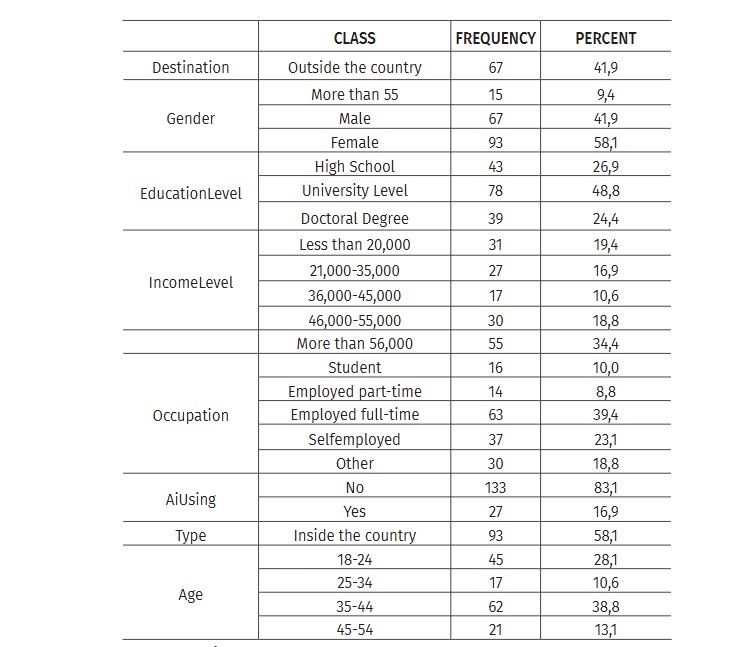
Source: Author’s explanation
From the table above, the majority of respondents (58.1%) chose to travel within the country, while 41.9% travelled outside Algeria. The largest age group was 35-44 (38.8%), followed by 18-24 (28.1%). The sample was relatively balanced, with 41.9% male and 58.1% female respondents. A significant portion (48.8%) had a university-level education, followed by doctoral degrees (24.4%) and high school (26.9%). The most common income bracket was “more than 56,000” (34.4%), indicating a relatively high-income sample. The largest occupational group was “employed full-time” (39.4%), followed by self-employed (23.1%). A smaller proportion of respondents (16.9%) reported using specialized apps integrated with AI in their travels, while the majority (83.1%) did not; they use their recommendations from notifications generated based on their research.
Descriptive statistics of factors
The provided descriptive statistics we get from SPSS calculations summarize the responses to the questionnaire items across four dimensions: Daily green behaviours and public self-awareness, AI-Driven Personalisation, Eco-Conscious Behaviour, and Traveller Satisfaction. The statistics include the number of valid responses (N), mean values, and standard deviation for each item.
Table 3: Measuring the traveller satisfaction and Eco-Consciousness Behaviour regarding the use of
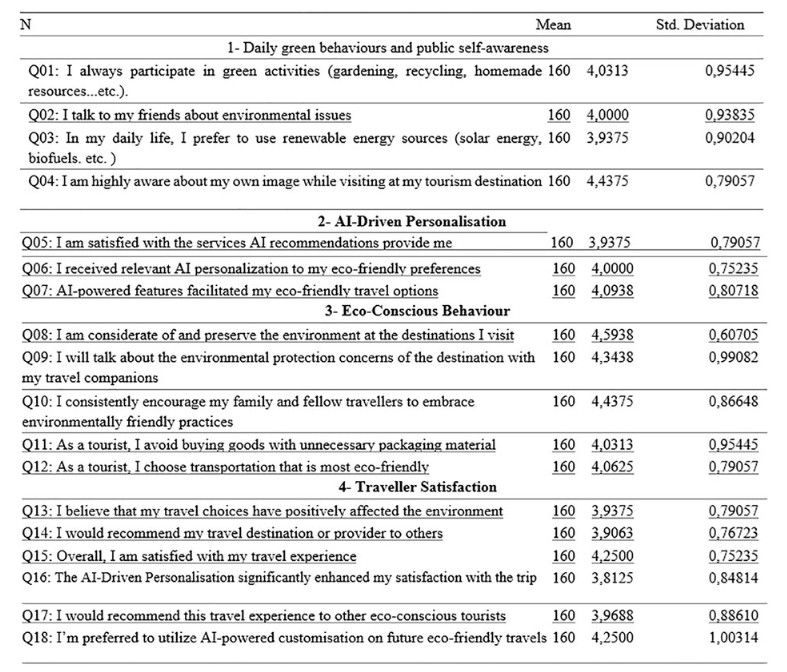
Source: Author’s explanation
TABLE 4: DESCRIPTIVE ANALYSIS OF THE RESPONDENTS’ OPINIONS ACCORDING TO THE IMPACT OF AI-DRIVEN PERSONALISATION AS FACTOR IMPACT TRAVELLER SATISFACTION AND ECO-CONSCIOUSNESS BEHAVIOUR

The results in Table 4, the mean values for all variables are relatively high, suggesting generally positive perceptions. And the standard deviation for all variables is moderate, indicating some variability in responses. Results also indicate that Eco-Conscious Behaviour is ranked highest, meaning that participants perceive it as having the greatest impact. And unlike Eco-Conscious Behaviour, AI-Driven Personalisation is ranked lowest, indicating a perceived lesser impact.
Based on these results, we conclude that Eco-Conscious Behaviour is a crucial factor influencing traveller satisfaction. This highlights the importance of incorporating sustainability into travel experiences. On the other hand, while AI-Driven Personalisation is ranked lower, it still has a positive impact on traveller satisfaction. This suggests that personalized experiences can contribute to a more enjoyable trip, even if they are not the primary driver of satisfaction. Finally, the scale All Variables ranking suggests that the combination of all factors, including AI-Driven Personalisation, destination-based preferences, eco-conscious behaviour, and traveller satisfaction, has a significant impact on the overall travel experience.
Hypotheses of the study test
Hypothesis 1: There is a significant positive relationship between AI-Driven Personalisation and traveller Satisfaction and Eco-Consciousness Behaviour.
Table 5 provides correlation coefficients between the main variables of the study: AI-Driven Personalisation, Eco-Conscious Behaviour, Traveller Satisfaction, and Scale All Variables. These coefficients indicate the strength and direction of the relationships between these variables.
Table 5: The relationships between the main variables of the study
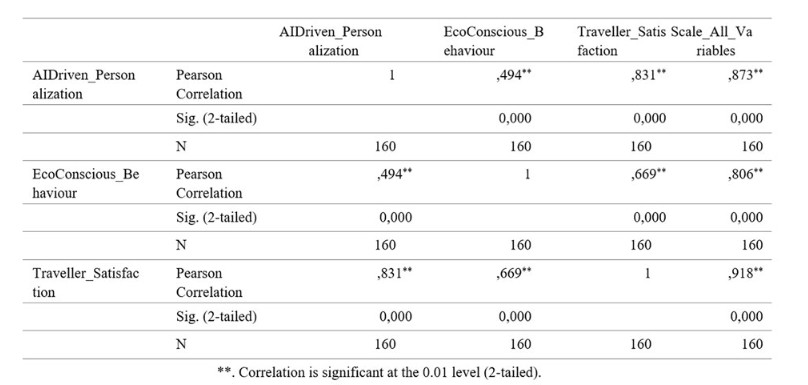
Source: Author’s explanation
Results found that A strong positive correlation of 0.831 exists between these two variables, supporting Hypothesis 1. This suggests that AI-Driven Personalisation is significantly associated with higher levels of traveller satisfaction. There is also a moderately strong positive correlation of 0.494 between AI-Driven Personalisation and Eco-Conscious Behaviour, further supporting Hypothesis 1. This indicates that personalized experiences can positively influence travellers’ eco-conscious behaviour. Also, we found a significant positive correlation of 0.669 observed between these two variables, suggesting that engaging in EcoConscious Behaviour can enhance traveller satisfaction.
Overall, the results in Table 5 strongly support Hypothesis 1. “There is a significant positive relationship between AI-Driven Personalisation and traveller Satisfaction and EcoConsciousness Behaviour”.
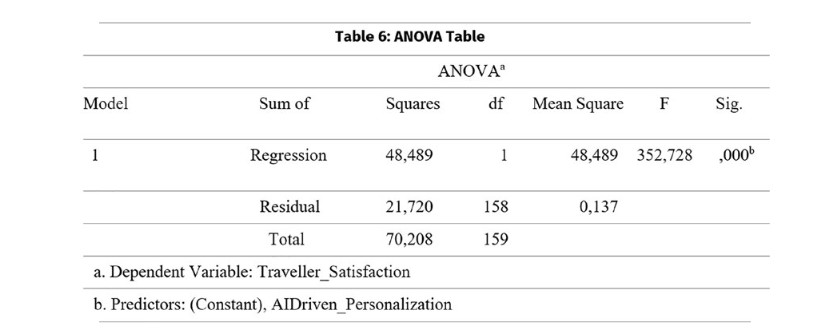
Hypothesis 2: Higher levels of AI-Driven Personalisation have a significant impact on traveller Satisfaction.
Table 6 presents the results of an ANOVA (Analysis of Variance) test, which is used to determine whether there are significant differences between groups or models. In this case, the ANOVA is examining the relationship between AI-Driven Personalisation and Traveller Satisfaction.
The ANOVA results in Table 6 provide strong evidence that AI-Driven Personalisation is a significant predictor of Traveller Satisfaction. The large F-statistic and highly significant p-value confirm that the model (including AI-Driven Personalisation) explains a significant amount of the variation in Traveller Satisfaction. This supports the findings from previous analyses and reinforces the importance of AI-Driven Personalisation in enhancing traveller experiences.
Table 7 presents the coefficients for the regression model predicting Traveller Satisfaction based on AI-Driven Personalisation. These coefficients represent the standardized beta weights and their associated t-statistics and significance levels.
Table 7: Table of Coefficients

Source: The author based on SPSS results
The results provide a standardized beta coefficient of 0.836 for AI-Driven Personalisation is relatively high, suggesting a strong positive relationship with Traveller Satisfaction. And, the t-statistic of 18,781 is extremely large, indicating that AI-Driven Personalisation is a highly significant predictor of Traveller Satisfaction. In conclusion, the results in Table 7 provide strong evidence that AI-Driven Personalisation is a significant and influential predictor of Traveller Satisfaction. The high beta coefficient and significant t-statistic demonstrate the substantial impact of personalized experiences on enhancing traveller satisfaction.
Finally, the results from Table 6, and Table 7 consistently indicate a strong positive relationship between AI-Driven Personalisation and Traveller Satisfaction. The high correlation coefficient, significant F-statistic, and significant beta coefficient all point to the conclusion that higher levels of AI-Driven Personalisation are indeed significantly associated with increased traveller satisfaction. And, the hypothesis
Hypothesis 2: Higher levels of AIDriven personalization significantly impact traveller Satisfaction” is supported.
Hypothesis 3: Higher levels of AI-Driven Personalisation have a significant impact on Tourist Eco-Consciousness Behaviour
Table 8 presents the model summary for a regression analysis where AI-Driven Personalisation is the predictor variable and Eco-Conscious Behavior is the outcome variable.

Source: Author’s explanation
Results shown in Table 8 provide strong evidence that AI-Driven Personalisation is a significant predictor of Eco-Conscious Behaviour. The large F-statistic and highly significant p-value confirm that the model (including AI-Driven Personalisation) explains a significant amount of the variation in Eco-Conscious Behaviour. This suggests that personalized experiences can play a role in influencing travellers’ eco-conscious behaviour.
Table 9 presents the coefficients for the regression model predicting EcoConscious_Behaviour based on AI-Driven Personalisation. These coefficients represent the unstandardized and standardized beta weights, along with their associated t-statistics and significance levels.

Source: Author’s explanation
The coefficient of 0.473 indicates that for every one-unit increase in AI-Driven Personalisation, Eco-Conscious Behaviour increases by 0.473 units, holding other variables constant. And, the t-statistic of 7.147 is significantly large, indicating that AI-Driven Personalisation is a highly significant predictor of Eco-Conscious Behaviour, with the p-value of 0.000 being significantly less than 0.05, confirming the significance of AI-Driven Personalisation as a predictor. Hence, the results in Table 9 provide strong evidence that AIDriven Personalization is a significant and influential predictor of Eco-Conscious Behaviour.
The positive coefficient and significant t-statistic demonstrate that personalized experiences can effectively encourage travellers to adopt more Eco-Conscious Behaviours.
Finally, based on the results from Table 8 and Table 9, Hypothesis 3: Higher levels of AI-Driven Personalisation significantly impact Tourist Eco-Consciousness Behaviour is supported.
Hypothesis 4: Higher levels of Eco-Consciousness Behaviour personalisation have a significant impact on Traveller Satisfaction.
Table 10 presents the coefficients for a regression model predicting Traveler Satisfaction using Eco-Conscious Behaviour as the predictor variable. The coefficient of 0.703 indicates that for every one-unit increase in Eco-Conscious Behaviour, Traveler Satisfaction increases by 0.703 units, holding other variables constant. The beta coefficient of 0.669 suggests a moderately strong positive relationship between Eco-Conscious Behaviour and Traveler Satisfaction. The t-statistic of 11.307 is significantly large, indicating that Eco-Conscious Behaviour is a highly significant predictor of Traveler Satisfaction. While the p-value of 0.000 is significantly less than 0.05, confirming the significance of EcoConscious_Behaviour as a predictor
The results in Table 10 provide strong evidence that Eco-Conscious Behaviour is a significant and influential predictor of Traveler Satisfaction. The positive coefficient and significant t-statistic demonstrate that engaging in eco-conscious behaviour can significantly enhance the overall travel experience.
Table 10 presents the coefficients for a regression model predicting Traveler Satisfaction using Eco-Conscious Behaviour as the predictor variable. The coefficient of 0.703 indicates that for every one-unit increase in Eco-Conscious Behaviour, Traveler Satisfaction increases by 0.703 units, holding other variables constant. The t-statistic of 11.307 is significantly large, indicating that Eco-Conscious Behaviour is a highly significant predictor of Traveler Satisfaction. And, the p-value of 0.000 is significantly less than 0.05, confirming the significance of EcoConscious_Behaviour as a predictor.

Source: Author’s explanation
The results in Table 10 provide strong evidence that Eco-Conscious Behaviour is a significant and influential predictor of Traveler Satisfaction. The positive coefficient and significant t-statistic demonstrate that engaging in eco-conscious behaviour can significantly enhance the overall travel experience.
Therefore, the hypothesis “Hypothesis 4: Higher levels of Eco-Consciousness Behaviour significantly impact Traveler Satisfaction” can be supported based on the provided results.
Hypothesis 5: The impact of AI-Driven Personalisation significantly varies across different demographic groups of Using Specialized platforms, Age, and Educational Level.
Table 11 presents the results of one-way ANOVAs to examine whether the impact of AIDriven Personalization varies across different demographic groups: Using Specialized Platforms, Age, and Educational Level.
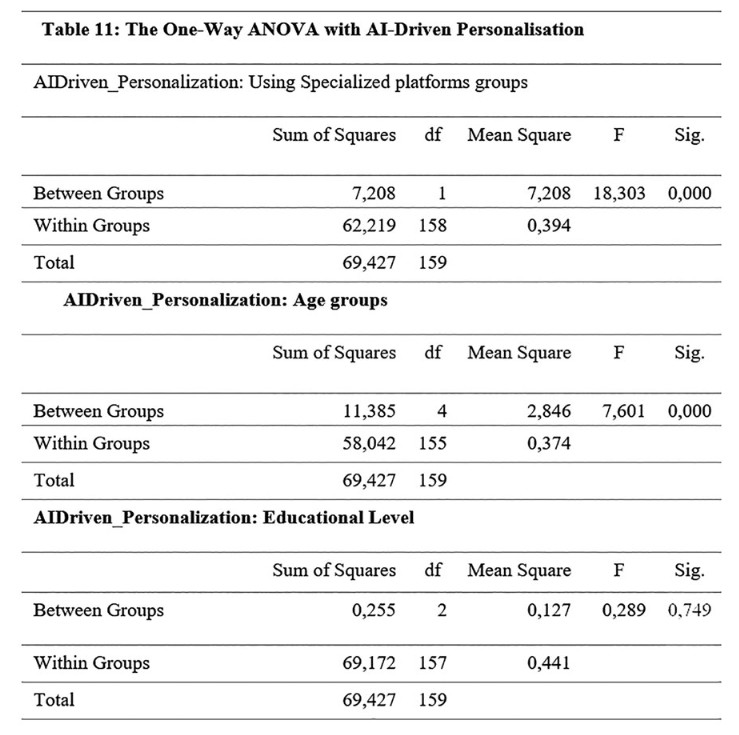
Source: Author’s explanation
The F-statistic is 18,303 with a p-value of 0.000, indicating a significant difference in the impact of AI-Driven Personalisation across different groups using specialized platforms. The F-statistic is 7,601 with a p-value of 0.000, suggesting a significant difference in the impact of AI-Driven Personalisation across different age groups. Also, the F-statistic is 0.289 with a p-value of 0.749. This indicates that there is no significant difference in the impact of AIDriven Personalization across different educational levels.
Accordingly, and based on the results, Hypothesis 5 is partially supported. The impact of AI-Driven Personalisation significantly varies across different groups using specialized platforms and different age groups, but does not vary significantly across different educational levels.
Hypothesis 6: The impact of Eco-Consciousness significantly varies across different demographic groups of Age, Educational Level, and Gender.
Table 12 presents the results of one-way ANOVAs to examine whether the impact of EcoConscious Behaviour varies across different demographic groups: Age, Educational Level, and Gender. The F-statistic is 17,218 with a p-value of 0.000, indicating a significant difference in the impact of Eco-Conscious Behaviour across different age groups. The F-statistic is 9,553 with a p-value of 0.000, suggesting a significant difference in the impact of Eco-Conscious Behaviour across different educational levels. The F-statistic is 3,301 with a p-value of 0.071. While this is marginally significant, it suggests a possible trend towards a difference in the impact of Eco-Conscious Behaviour across different gender groups.
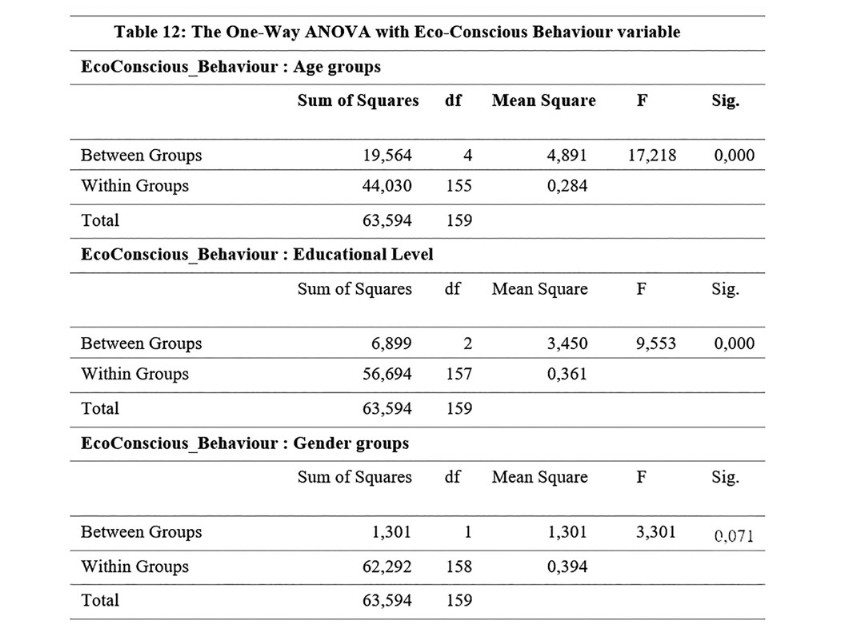
Source: The author based on SPSS results
Based on the results, Hypothesis 6 is partially supported. The impact of Eco-Conscious Behaviour significantly varies across different age groups and educational levels, but there is only marginal evidence for a difference across gender groups.
Hypothesis 7: The impact of Traveller Satisfaction significantly varies across different demographic groups of Age, Educational Level, and Gender.
Table 13 presents the results of one-way ANOVAs to examine whether the impact of Traveler Satisfaction varies across different demographic groups: Age, Educational Level, and Gender. The F-statistic is 12,198 with a p-value of 0.000, indicating a significant difference in the impact of Traveler Satisfaction across different age groups. The F-statistic is 0.262 with a p-value of 0.770, suggesting no significant difference in the impact of Traveler Satisfaction across different educational levels. The F-statistic is 6,341 with a p-value of 0.013, indicating a significant difference in the impact of Traveler Satisfaction across different gender groups.
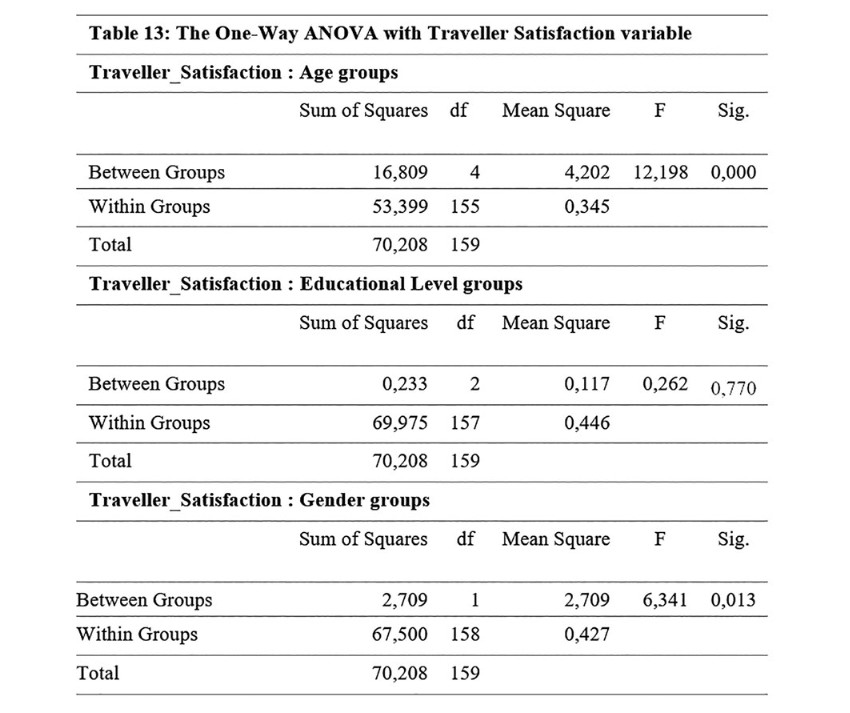
Source: The author based on SPSS results
Consequently, Hypothesis 7 is partially supported. The impact of Traveler Satisfaction significantly varies across different age groups and gender groups, but does not vary significantly across different educational levels.
Hypothesis 8: The Daily green behaviours and public self-awareness will moderate the relationship between AI-Driven Personalisation and traveller Eco-Consciousness Behaviour.
Table 14 presents the coefficients for a regression model predicting Eco-Conscious Behaviour, including AI-Driven Personalisation, DB_PS (a construct related to destination-based preferences and services), and their interaction term as predictors. The standardized beta coefficient of 0.392 for AI-Driven Personalisation is positive and significant, suggesting a direct positive relationship with Eco-Conscious Behaviour. The standardized beta coefficient of 0.152 for DB_PS is positive but not significant, indicating that while it has some influence on Eco-Conscious Behaviour, it’s not a strong predictor. Furthermore, the standardized beta coefficient of -0.150 for the interaction term (AI-Driven Personalisation * DB_PS) is negative and significant. This suggests that the relationship between AI-Driven Personalisation and Eco-Conscious Behaviour is moderated by DB_PS.
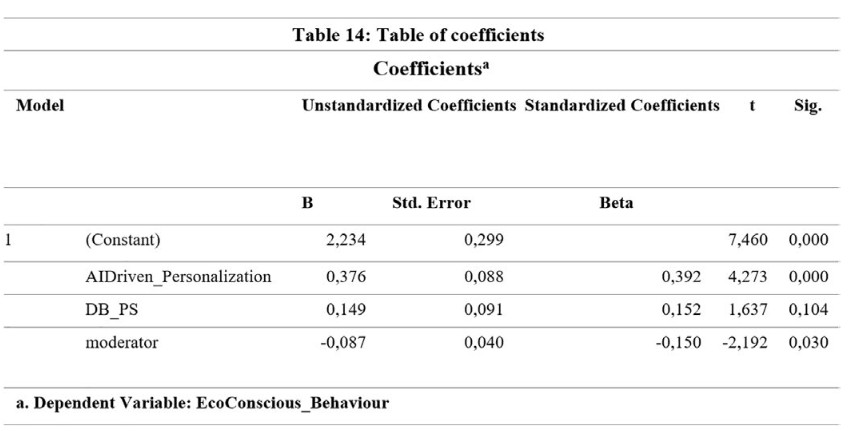
Source: The author based on SPSS results
Then, Hypothesis 8 is supported. The results indicate that the relationship between AIDriven Personalization and Eco-Conscious Behaviour is indeed moderated by DB_PS. Specifically, the positive impact of AI-Driven Personalisation on Eco-Conscious Behaviour is likely to be stronger when DB_PS is lower.
Hypothesis 8 is supported. The results indicate that the relationship between AI-Driven Personalisation and Eco-Conscious Behaviour is indeed moderated by DB_PS. Specifically, the positive impact of AI-Driven Personalisation on Eco-Conscious Behaviour is likely to be stronger when DB_PS is lower.
Figure 2: Interactions between AI-Driven Personalisation, Daily green behaviours, and Public self-awareness.
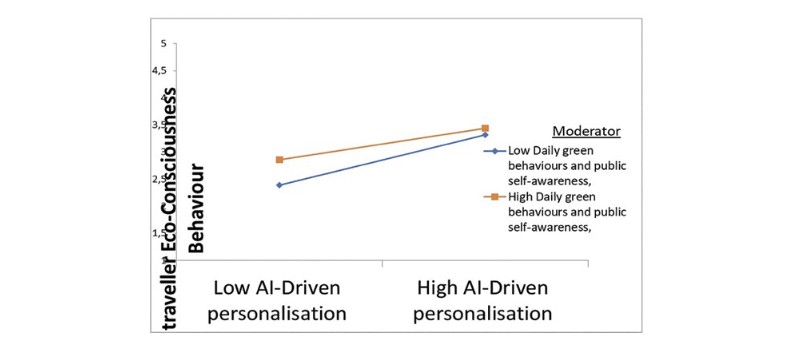
Source: Slope visual analysis is generated using James Gaskin’s Excel StatTool (StatWiki, 2024)
The moderation plot shown in Figure 2 confirms that Daily Green Behaviours and Public Self-Awareness indeed moderate the relationship between AI-Driven Personalisation and Traveler Eco-Consciousness Behaviour. This suggests that the effectiveness of AI-Driven Personalisation in promoting eco-conscious behaviour may depend on the individual traveller’s existing level of environmental awareness and engagement.
Figure 3: Final conceptual framework.
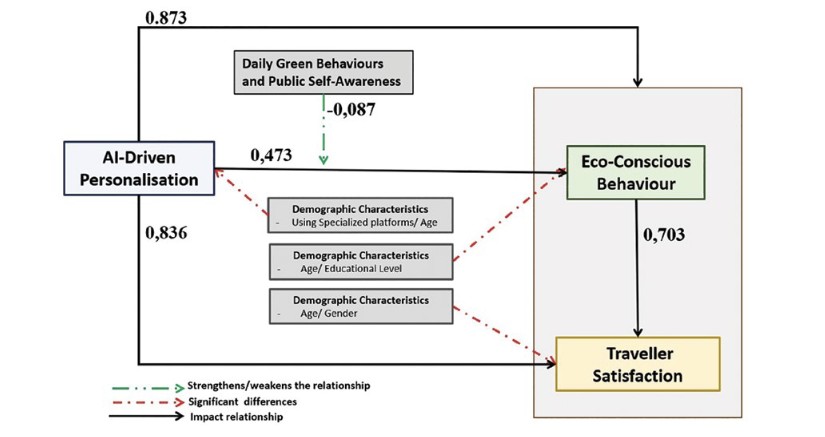
Source: The author based on SPSS results
Conclusion
This study aimed to investigate the impact of AI-Driven Personalisation on Traveler Satisfaction and Eco-Conscious Behaviour among Algerian travellers. Through a comprehensive analysis of survey data, several key findings have emerged.
AI-Driven Personalisation and Traveler Satisfaction: Research indicates that AI-Driven Personalisation has a significant positive impact on traveller satisfaction. This indicates that personalized experiences enhance the overall travel experience for Algerian travellers.
AI-Driven Personalisation and Eco-Conscious Behaviour: AI-Driven Personalisation was also shown to have a positive impact on Eco-Conscious Behaviour among travellers. This indicates that personalized experiences can support travellers to adopt more sustainable attitudes.
Moderating Effects: The relationship between AI-Driven Personalisation and Eco-Conscious
Behaviour was found to be moderated by Daily Green Behaviours and Public Self-awareness. The travellers with higher levels of environmental awareness and involvement exhibit eco-conscious behaviour when faced with personalized experiences.
Demographic Variations: The impact of AI-Driven Personalisation and Eco-Conscious Behaviour varied through different demographic groups. Age and platform usage were found to influence the effectiveness of these factors.
Finally, the findings of our study show that AI-Driven Personalisation can be a valuable tool to promote sustainable tourism and enhance traveller satisfaction. By personalizing experiences to travellers’ preferences and needs, tourism service providers can encourage travellers to adopt more eco-conscious behaviours and attitudes to ensure a positive and memorable journey.
Challenges and Considerations
While AI-Driven Personalisation offers significant potential impact on travellers’ satisfaction and eco-consciousness attitudes, it’s important to address several challenges, and tourism providers must take into account data privacy, ethical implications, technical limitations, and user acceptance. And the travel industry can harness the power of AI to promote sustainable tourism and create memorable experiences for travellers.
Future Scope of Research
The provided recommendations advocate for a comprehensive approach to AI-Driven Personalisation in eco-conscious travel. They suggest conducting long-term studies to assess its impact, developing ethical frameworks, ensuring scalability and affordability, considering cross-cultural perspectives, integrating with emerging technologies, fostering collaboration, and establishing global governance. By addressing these areas, the tourism industry can effectively leverage AI to promote sustainable practices while ensuring ethical and responsible travel experiences.
Bibliography:
- Akter, S., Babu, M. M., Hani, U., Sultana, S., Bandara, R., & Grant, D. (2024). Unleashing the power of artificial intelligence for climate action in industrial markets;
- Industrial Marketing Management. Available at: <https://doi.org/10.1016/j.indmarman.2023.12.011>;
- Almquist, Y. B., Signild Kvart, Brännström, L. (2020). A practical guide to quantitative methods with SPSS. 3787995 Bytes. Available at: <https://doi.org/10.17045/STHLMUNI.10321829>;
- com Partners (Director). (2023, October 10). New & Next at Booking.com [Video recording]. Available at: <https://www.youtube.com/watch?v=_Jsdc7mZHg8>.
- Chen, G., Peng, J. (2023). Promoting sustainable tourism destinations: Support and its role in tourist environmentally responsible behaviour. Environment, Development and Sustainability. Available at: <https://doi.org/10.1007/s10668-023-04095-y>;
- Dalla Vecchia, A., Migliorini, S., Quintarelli, E., Gambini, M., Belussi, A. (2024). Promoting sustainable tourism by recommending sequences of attractions with deep reinforcement learning. Information Technology & Tourism, 26(3). Available at: <https://doi.org/10.1007/s40558-024-00288-x>;
- Escobar-Farfán, M., Cervera-Taulet, A., Schlesinger, W. (2024). Destination brand identity: Challenges, opportunities, and future research agenda. Cogent Social Sciences, 10(1), 2302803. Available at: <https://doi.org/10.1080/23311886.2024.2302803>;
- (2018, June 19). Skyscanner and ForwardKeys join forces to reveal the future of regional travel behaviour. Available at: <https://forwardkeys.com/skyscannerand-forwardkeys-join-forces-to-reveal-the-future-of-regional-travel-behaviour/>;
- Jorzik, P., Antonio, J. L., Kanbach, D. K., Kallmuenzer, A., Kraus, S. (2024). Sowing the seeds for sustainability: A business model innovation perspective on artificial intelligence in green technology startups. Technological Forecasting and Social Change, 208, 123653. Available at: <https://doi.org/10.1016/j.techfore.2024.123653>;
- Ku, E. C. S., Chen, C.-D. (2024). Artificial intelligence innovation of tourism businesses: From satisfied tourists to continued service usage intention. International Journal of Information Management, 76, 102757. Available at: <https://doi.org/10.1016/j.ijinfomgt.2024.102757>;
- Kumar, P., Aggarwal, B., Kumar, V., Saini, H. (2024). Sustainable tourism progress: A 10-year bibliometric analysis. Cogent Social Sciences, 10(1), 2299614. Available at: <https://doi.org/10.1080/23311886.2023.2299614>;
- Kvasova, O. (2015). The Big Five personality traits as antecedents of eco-friendly tourist behavior. Personality and Individual Differences, 83. Available at: <https://doi.org/10.1016/j.paid.2015.04.011>;
- Majid, G. M., Tussyadiah, I., Kim, Y. R., Pal, A. (2023). Intelligent automation for sustainable tourism: A systematic review. Journal of Sustainable Tourism, 31(11). Available at: <https://doi.org/10.1080/09669582.2023.2246681>;
- Malik, S., Muhammad, K., Waheed, Y. (2024). Artificial intelligence and industrial applications - A revolution in modern industries. Ain Shams Engineering Journal, 15(9), 102886. Available at: <https://doi.org/10.1016/j.asej.2024.102886>;
- Milton, D. T. (2024). Artificial Intelligence Transforming Hotel Gastronomy: An In-depth Review of AI-driven Innovations in Menu Design, Food Preparation, and Customer Interaction, with a Focus on Sustainability and Future Trends in the Hospitality Industry. International Journal for Multidimensional Research Perspectives, 2(3), Article 3. Available at: <https://doi.org/10.61877/ijmrp.v2i3.126>.
- gov.dz. (2008). Le Schéma Directeur d’Aménagement Touristique 2030. Ministère de l’Aménagement du Territoire, de l’Environnement et du Tourisme. Available at: <https://www.mta.gov.dz/le-schema-directeur-damenagement-touristique-030/?lang=fr>;
- gov.dz. (2023). Connaître l’Algérie. Available at: <https://www.mta.gov.dz/connaitrelalgerie/?lang=fr>;
- Ozcan, B., Bozoklu, S., Khan, D. (2021). Tourism Sector and Environmental Quality: Evidence from Top 20 Tourist Destinations. In D. Balsalobre-Lorente, O. M. Driha, M. Shahbaz (Eds.), Strategies in Sustainable Tourism, Economic Growth and Clean Energy. Springer International Publishing. Available at: <https://doi.org/10.1007/978-3-030-596750_3>;
- Ribeiro, M. A., Seyfi, S., Elhoushy, S., Woosnam, K. M., Patwardhan, V. (2023). Determinants of Generation Z pro-environmental travel behaviour: The moderating role of green consumption values. Journal of Sustainable Tourism. Available at: <https://doi.org/10.1080/09669582.2023.2230389>;
- Sadiq, M., Adil, M., Paul, J. (2022). Eco-friendly hotel stay and environmental attitude: A value-attitude-behaviour perspective. International Journal of Hospitality Management, 100, 103094. Available at: <https://doi.org/10.1016/j.ijhm.2021.103094>;
- Sahabuddin, M., Alam, Md. S., Nekmahmud, Md. (2024). How do perceived and environmental values influence tourist satisfaction, loyalty, and environmental awareness? Environment, Development and Sustainability. Available at: <https://doi.org/10.1007/s10668-024-050943>;
- (2023, December 15). Our commitment to net zero. Available at: <https://www.skyscanner.net/media/sustainability/our-commitment-to-net-zero>;
- (2024, July 12). Booking.com: Total website visits worldwide 2024. Available at: <https://www.statista.com/statistics/1294912/total-visits-to-booking-website/>;
- (2024, May 14). Available at: <https://statwiki.gaskination.com/index.php?title=Main_Page;
- Su, L., Li, M., Wen, J., He, X. (2024). How do tourism activities and induced awe affect tourists’ pro-environmental behavior? Tourism Management, 106, 105002. Available at: <https://doi.org/10.1016/j.tourman.2024.105002>;
- (2015). What Is Ecotourism. The International Ecotourism Society. Available at: <https://ecotourism.org/what-is-ecotourism/>;
- UNEP & WTO. (2005). Making Tourism more Sustainable (United Nations).
- UNESCO World Heritage centre. (n.d.). World Heritage List. Available at: <https://whc.unesco.org/en/list> (Last access: 16.09.2024).
Footnotes
[1] Malik, S., Muhammad, K., Waheed, Y. (2024). Artificial intelligence and industrial applications - A revolution in modern industries. Ain Shams Engineering Journal, 15(9), 102886. Available at: <https://doi.org/10.1016/j.asej.2024.102886>.
[2] Jorzik, P., Antonio, J. L., Kanbach, D. K., Kallmuenzer, A., Kraus, S. (2024). Sowing the seeds for sustainability: A business model innovation perspective on artificial intelligence in green technology startups. Technological Forecasting and Social Change, 208, 123653. Available at: <https://doi.org/10.1016/j.techfore.2024.123653>.
[3] UNEP & WTO. (2005). Making Tourism more Sustainable (United Nations).
[4] Majid, G. M., Tussyadiah, I., Kim, Y. R., Pal, A. (2023). Intelligent automation for sustainable tourism: A systematic review. Journal of Sustainable Tourism, 31(11), 2421– 2440. Available at: <https://doi.org/10.1080/09669582.2023.2246681>.
[5] Chen, G., Peng, J. (2023). Promoting sustainable tourism destinations: Support and its role in tourist environmentally responsible behaviour. Environment, Development and Sustainability. Available at: <https://doi.org/10.1007/s10668-023-04095-y>.
[6] TIES. (2015). What Is Ecotourism. The International Ecotourism Society. Available at: <https://ecotourism.org/what-is-ecotourism/>.
[7] Kumar, P., Aggarwal, B., Kumar, V., Saini, H. (2024). Sustainable tourism progress: A 10-year bibliometric analysis. Cogent Social Sciences, 10(1), 2299614. Available at: <https://doi.org/10.1080/23311886.2023.2299614>.
[8] Akter, S., Babu, M. M., Hani, U., Sultana, S., Bandara, R., Grant, D. (2024). Unleashing the power of artificial intelligence for climate action in industrial markets.
[9] Dalla Vecchia, A., Migliorini, S., Quintarelli, E., Gambini, M., Belussi, A. (2024). Promoting sustainable tourism by recommending sequences of attractions with deep reinforcement learning. Information Technology & Tourism, 26(3), 449–484. Available at: <https://doi.org/10.1007/s40558-024-00288-x>.
[10] Milton, D. T. (2024). Artificial Intelligence Transforming Hotel Gastronomy: An In-depth Review of AI-driven Innovations in Menu Design, Food Preparation, and Customer Interaction, with a Focus on Sustainability and Future Trends in the Hospitality Industry. International Journal for Multidimensional Research Perspectives, 2(3), Article 3. Available at: <https://doi.org/10.61877/ijmrp.v2i3.126>.
[11] Ozcan, B., Bozoklu, S., Khan, D. (2021). Tourism Sector and Environmental Quality: Evidence from Top 20 Tourist Destinations. In D. Balsalobre-Lorente, O. M. Driha, & M. Shahbaz (Eds.), Strategies in Sustainable Tourism, Economic Growth and Clean Energy. Springer International Publishing, 39–66. Available at: <https://doi.org/10.1007/978-3-030-596750_3>.
[12] Sahabuddin, M., Alam, Md. S., Nekmahmud, Md. (2024). How do perceived and environmental values influence tourist satisfaction, loyalty, and environmental awareness? Environment, Development and Sustainability. Available at: <https://doi.org/10.1007/s10668-024-050943>.
[13] Chen, G., Peng, J. (2023). Promoting sustainable tourism destinations: Support and its role in tourist environmentally responsible behaviour. Environment, Development and Sustainability. Available at: <https://doi.org/10.1007/s10668-023-04095-y>.
[14] Ku, E. C. S., Chen, C.-D. (2024). Artificial intelligence innovation of tourism businesses: From satisfied tourists to continued service usage intention. International Journal of Information Management, 76, 102757, Available at: <https://doi.org/10.1016/j.ijinfomgt.2024.102757>.
[15] Escobar-Farfán, M., Cervera-Taulet, A., Schlesinger, W. (2024). Destination brand identity: Challenges, opportunities, and future research agenda. Cogent Social Sciences, 10(1), 2302803. Available at: <https://doi.org/10.1080/23311886.2024.2302803>.
[16] Kvasova, O. (2015). The Big Five personality traits as antecedents of eco-friendly tourist behavior. Personality and Individual Differences, 83, 111–116. Available at: <https://doi.org/10.1016/j.paid.2015.04.011>.
[17] Su, L., Li, M., Wen, J., He, X.2024. How do tourism activities and induced awe affect tourists’ pro-environmental behavior? Tourism Management, 106, 105002. Available at: <https://doi.org/10.1016/j.tourman.2024.105002>.
[18] Ribeiro, M. A., Seyfi, S., Elhoushy, S., Woosnam, K. M., Patwardhan, V. (2023). Determinants of Generation Z pro-environmental travel behaviour: The moderating role of green consumption values. Journal of Sustainable Tourism. Scopus Available at: <https://doi.org/10.1080/09669582.2023.2230389>.
[19] Sadiq, M., Adil, M., Paul, J. (2022). Eco-friendly hotel stay and environmental attitude: A value-attitude-behaviour perspective. International Journal of Hospitality Management, 100, 103094. Available at: <https://doi.org/10.1016/j.ijhm.2021.103094>.
[20] Statista. (2024, July 12). Booking.com: Total website visits worldwide 2024. Statista. Available at: <https://www.statista.com/statistics/1294912/total-visits-to-booking-website/>.
[21] Booking.com Partners (Director). (2023, October 10). New & Next at Booking com [Video recording]. Available at: <https://www.youtube.com/watch?v=_Jsdc7mZHg8>.
[22] Skyscanner. (2023, December 15). Our commitment to net zero. Available at: <https://www.skyscanner.net/media/sustainability/our-commitment-to-net-zero>.
[23] ForwardKeys. (2018, June 19). Skyscanner and ForwardKeys join forces to reveal the future of regional travel behaviour. Available at: <https://forwardkeys.com/skyscannerand-forwardkeys-join-forces-to-reveal-the-future-of-regional-travel-behaviour/>.
[24] Mta.gov.dz. (2008). Le Schéma Directeur d’Aménagement Touristique 2030. Ministère de l’Aménagement du Territoire, de l’Environnement et du Tourisme. Available at: <https://www.mta.gov.dz/le-schema-directeur-damenagement-touristique-030/?lang=fr>.
[25] Mta.gov.dz. (2023). Connaitre l’algerie. Available at: <https://www.mta.gov.dz/connaitrelalgerie/?lang=fr>.
[26] UNESCO World Heritage centre. (n.d.). World Heritage List. UNESCO World Heritage Centre. Available at: <https://whc.unesco.org/en/list/> (Last access: 16.09.2024).
[27] Almquist, Y. B., Signild K., Brännström, L. (2020). A practical guide to quantitative methods with SPSS. 3787995 Bytes. Available at: <https://doi.org/10.17045/STHLMUNI.10321829>.
Downloads
Downloads
Published
Issue
Section
License

This work is licensed under a Creative Commons Attribution-ShareAlike 4.0 International License.









